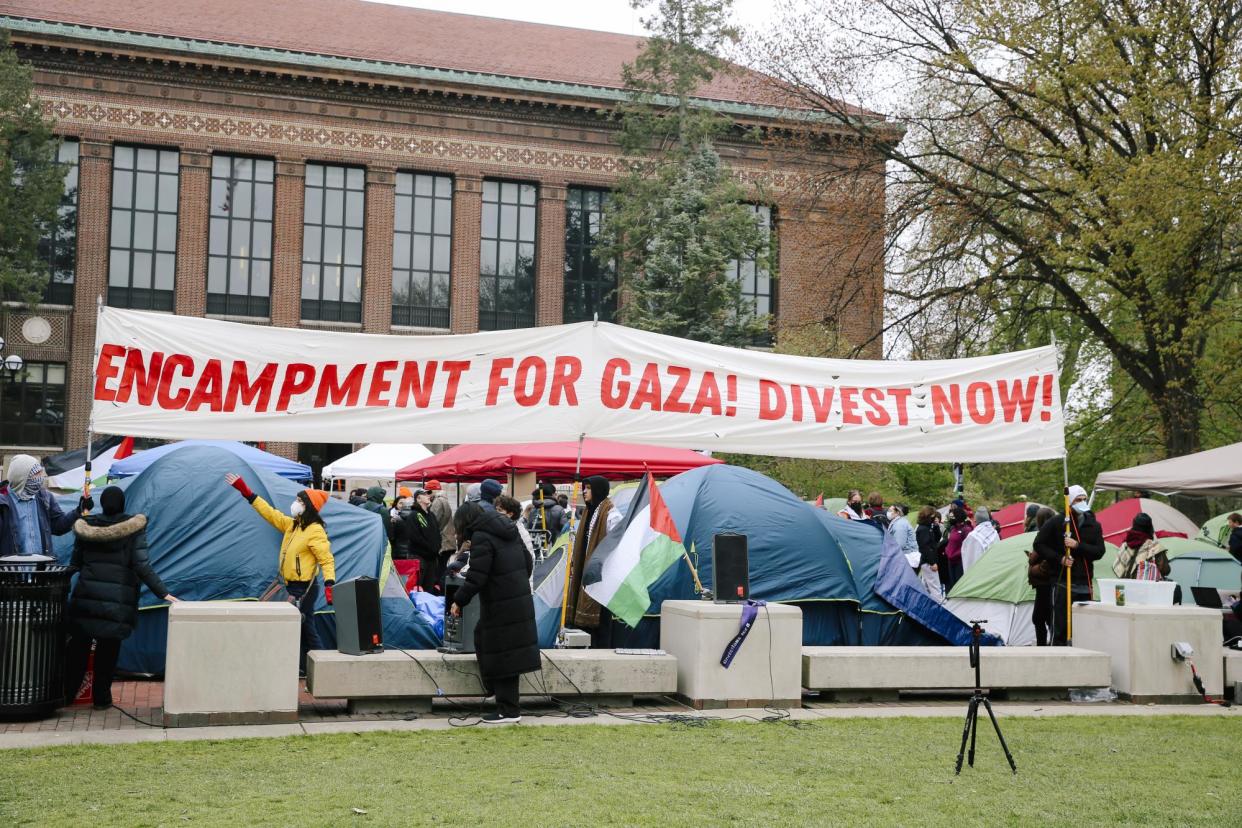Student protesters are demanding universities divest from Israel. What does that mean?

As protests against Israel’s offensive in Gaza are spreading throughout American campuses, one demand made by students across schools keeps coming up: divestment from Israel.
Related: How divestment became a ‘clarion call’ in anti-fossil fuel and pro-ceasefire protests
Universities rely on endowments to fund things like research and scholarships, and those endowments are typically invested in companies and alternative asset classes, such as private equity and hedge funds.
Broadly speaking, calls for divestment are demands to sell investments in companies that students say are complicit in the war. But what specifically are students asking for?
What are these divestment campaigns about?
Student protesters calling for divestment from the war in Gaza have chosen divergent targets.
At Columbia, students are demanding the university drop its direct investments in companies doing business in or with Israel, including Amazon and Google, which are part of a $1.2bn cloud-computing contract with Israel’s government; Microsoft, whose services are used by Israel’s ministry of defense and Israeli civil administration; and defense contractors profiting from the war such as Lockheed Martin, which on Tuesday reported its earnings were up 14%.
Students at the University of California, Berkeley, have similarly called for divestment of Israel across the board, as have student groups at New York University.
Other groups, such as Yale University’s Endowment Justice Coalition and student groups at Cornell University, are pushing administrators to drop investments in weapons manufacturers specifically.
Some campus organizers are fusing the demands for fossil fuel divestment, which has become a popular target of campus activism over the past decade, and divestment from the war in Gaza. On Monday, Sunrise’s Columbia chapter held a Reclaim Earth Day event at the Columbia encampment to call attention to the relationship between the climate crisis and the war in Gaza. That includes the emissions from the aircraft and tanks Israel is using for the war as well as those generated by making and launching bombs, artillery and rockets, not to mention the environmental devastation.
Yale’s Endowment Justice Coalition, which is leading the push for divestment from weapons manufacturers, is also calling for fossil fuel divestment.
Is there precedent for these kinds of divestment campaigns?
Divestment movements have a long history among US student activists.
In 1965, the Student Nonviolent Coordinating Committee, Students for a Democratic Society, and the Congress of Racial Equality held a New York City sit-in calling for Chase Bank to stop financing apartheid in South Africa. Throughout the 1970s and 1980s, many campus organizers also successfully pressured their schools to cut financial ties with companies that supported the apartheid regime, including Columbia, which became the first Ivy League university to do so.
Related:Israel, Gaza and divestment: why are Columbia students protesting?
The anti-apartheid campaign inspired another movement, too: the call for boycott, divestment and sanctions (BDS). Co-founded by the Palestinian Columbia University alumnus Omar Barghouti, BDS is a strategy that aims to end international support for Israel due to its treatment of Palestinians – a relationship many scholars and officials describe as another apartheid.
More recently, fossil fuel divestment campaigners have seen significant wins on US campuses, with about 250 US educational institutions committing to pull investments in polluting companies, according to data from Stand.earth and 350.org.
Is there any chance these campaigns will succeed?
Calls to divest from Israel have seen more muted success. While numerous campus groups have called for their institutions to take up the BDS framework, no US universities have made such a commitment.
In 2009, Hampshire College divested from a mutual fund with Israeli holdings after facing pressure from BDS activists. (Administrators officially denied the decision was boycott-related.)
Other colleges have been forced to consider the issue: in 2019, for instance, a Brown committee recommended the university divest from companies linked to human rights violations, said Olivia Katbi, organizer with the BDS movement.
Campus groups at some universities have also passed non-binding resolutions calling for divestment. American University’s student government association, for instance, passed a resolution on Sunday calling for the university to divest support from Israel, but the university president, Sylvia Burwell, has said the school would not comply with their demand.
Though they are facing an uphill battle, supporters of divestment say their campaigns have brought awareness to the issues they are highlighting.
Matt Leonard, director of the Oil and Gas Action Network and an early advocate for fossil fuel divestment in the US, said the campaigns against polluters had made it more difficult for oil majors to recruit young talent. He hopes to see the same dynamic play out for profiteers of the war in Gaza, including Lockheed Martin and Raytheon, which makes the Israeli missile defense system known as the Iron Dome.
But just as the movements have inspired one another, backlash has inspired backlash. In 2021, for instance, Texas passed a law forbidding the state from doing business with entities that “boycott energy companies”.
That law, which has sparked copycat legislation in several other states, was inspired by a 2017 law designed to prevent the state from doing business with entities that advocate BDS in support of Palestine.


